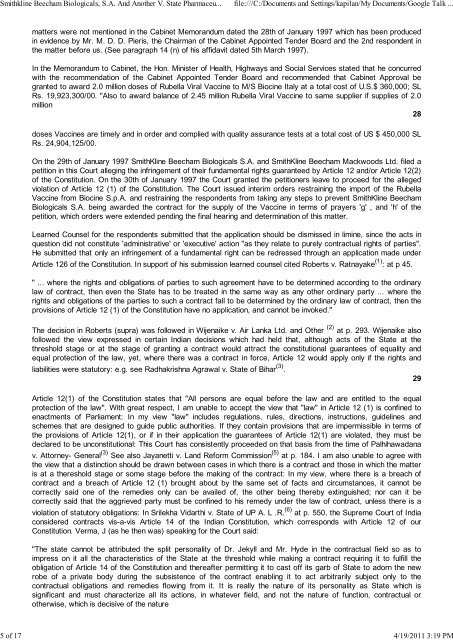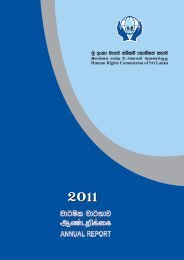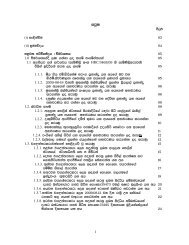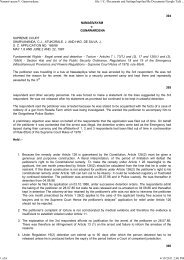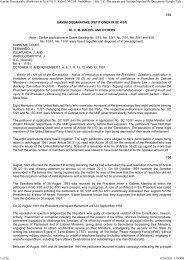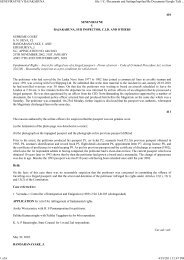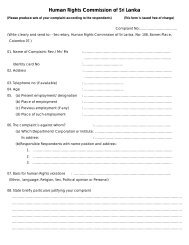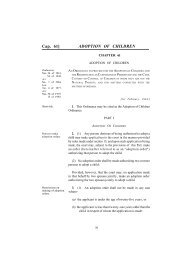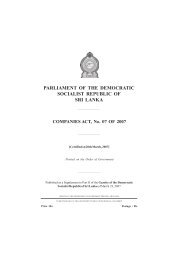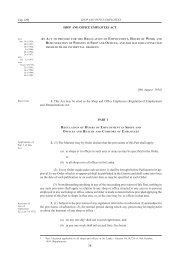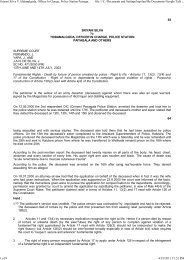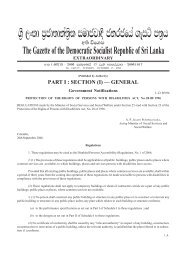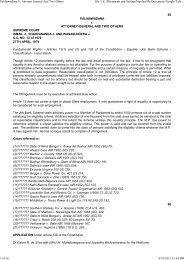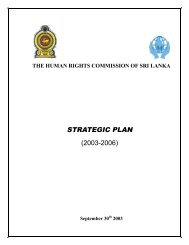Smithkline Beecham Biologic... - Human Rights Commission of Sri ...
Smithkline Beecham Biologic... - Human Rights Commission of Sri ...
Smithkline Beecham Biologic... - Human Rights Commission of Sri ...
Create successful ePaper yourself
Turn your PDF publications into a flip-book with our unique Google optimized e-Paper software.
<strong>Smithkline</strong> <strong>Beecham</strong> <strong>Biologic</strong>als, S.A. And Another V. State Pharmaceu... file:///C:/Documents and Settings/kapilan/My Documents/Google Talk ...<br />
matters were not mentioned in the Cabinet Memorandum dated the 28th <strong>of</strong> January 1997 which has been produced<br />
in evidence by Mr. M. D. D. Pieris, the Chairman <strong>of</strong> the Cabinet Appointed Tender Board and the 2nd respondent in<br />
the matter before us. (See paragraph 14 (n) <strong>of</strong> his affidavit dated 5th March 1997).<br />
In the Memorandum to Cabinet, the Hon. Minister <strong>of</strong> Health, Highways and Social Services stated that he concurred<br />
with the recommendation <strong>of</strong> the Cabinet Appointed Tender Board and recommended that Cabinet Approval be<br />
granted to award 2.0 million doses <strong>of</strong> Rubella Viral Vaccine to M/S Biocine Italy at a total cost <strong>of</strong> U.S.$ 360,000; SL<br />
Rs. 19,923,300/00. "Also to award balance <strong>of</strong> 2.45 million Rubella Viral Vaccine to same supplier if supplies <strong>of</strong> 2.0<br />
million<br />
28<br />
doses Vaccines are timely and in order and complied with quality assurance tests at a total cost <strong>of</strong> US $ 450,000 SL<br />
Rs. 24,904,125/00.<br />
On the 29th <strong>of</strong> January 1997 SmithKline <strong>Beecham</strong> <strong>Biologic</strong>als S.A. and SmithKline <strong>Beecham</strong> Mackwoods Ltd. filed a<br />
petition in this Court alleging the infringement <strong>of</strong> their fundamental rights guaranteed by Article 12 and/or Article 12(2)<br />
<strong>of</strong> the Constitution. On the 30th <strong>of</strong> January 1997 the Court granted the petitioners leave to proceed for the alleged<br />
violation <strong>of</strong> Article 12 (1) <strong>of</strong> the Constitution. The Court issued interim orders restraining the import <strong>of</strong> the Rubella<br />
Vaccine from Biocine S.p.A. and restraining the respondents from taking any steps to prevent SmithKline <strong>Beecham</strong><br />
<strong>Biologic</strong>als S.A. being awarded the contract for the supply <strong>of</strong> the Vaccine in terms <strong>of</strong> prayers 'g' , and 'h' <strong>of</strong> the<br />
petition, which orders were extended pending the final hearing and determination <strong>of</strong> this matter.<br />
Learned Counsel for the respondents submitted that the application should be dismissed in limine, since the acts in<br />
question did not constitute 'administrative' or 'executive' action "as they relate to purely contractual rights <strong>of</strong> parties".<br />
He submitted that only an infringement <strong>of</strong> a fundamental right can be redressed through an application made under<br />
Article 126 <strong>of</strong> the Constitution. In support <strong>of</strong> his submission learned counsel cited Roberts v. Ratnayake (1) : at p 45.<br />
" ... where the rights and obligations <strong>of</strong> parties to such agreement have to be determined according to the ordinary<br />
law <strong>of</strong> contract, then even the State has to be treated in the same way as any other ordinary party ... where the<br />
rights and obligations <strong>of</strong> the parties to such a contract fall to be determined by the ordinary law <strong>of</strong> contract, then the<br />
provisions <strong>of</strong> Article 12 (1) <strong>of</strong> the Constitution have no application, and cannot be invoked."<br />
The decision in Roberts (supra) was followed in Wijenaike v. Air Lanka Ltd. and Other (2) at p. 293. Wijenaike also<br />
followed the view expressed in certain Indian decisions which had held that, although acts <strong>of</strong> the State at the<br />
threshold stage or at the stage <strong>of</strong> granting a contract would attract the constitutional guarantees <strong>of</strong> equality and<br />
equal protection <strong>of</strong> the law, yet, where there was a contract in force, Article 12 would apply only if the rights and<br />
liabilities were statutory: e.g. see Radhakrishna Agrawal v. State <strong>of</strong> Bihar (3) .<br />
Article 12(1) <strong>of</strong> the Constitution states that "All persons are equal before the law and are entitled to the equal<br />
protection <strong>of</strong> the law". With great respect, I am unable to accept the view that "law" in Article 12 (1) is confined to<br />
enactments <strong>of</strong> Parliament: In my view "law" includes regulations, rules, directions, instructions, guidelines and<br />
schemes that are designed to guide public authorities. If they contain provisions that are impermissible in terms <strong>of</strong><br />
the provisions <strong>of</strong> Article 12(1), or if in their application the guarantees <strong>of</strong> Article 12(1) are violated, they must be<br />
declared to be unconstitutional: This Court has consistently proceeded on that basis from the time <strong>of</strong> Palhihawadana<br />
v. Attorney- General (3) See also Jayanetti v. Land Reform <strong>Commission</strong> (5) at p. 184. I am also unable to agree with<br />
the view that a distinction should be drawn between cases in which there is a contract and those in which the matter<br />
is at a thereshold stage or some stage before the making <strong>of</strong> the contract: In my view, where there is a breach <strong>of</strong><br />
contract and a breach <strong>of</strong> Article 12 (1) brought about by the same set <strong>of</strong> facts and circumstances, it cannot be<br />
correctly said one <strong>of</strong> the remedies only can be availed <strong>of</strong>, the other being thereby extinguished; nor can it be<br />
correctly said that the aggrieved party must be confined to his remedy under the law <strong>of</strong> contract, unless there is a<br />
violation <strong>of</strong> statutory obligations: In <strong>Sri</strong>lekha Vidarthi v. State <strong>of</strong> UP A. L .R. (6) at p. 550, the Supreme Court <strong>of</strong> India<br />
considered contracts vis-a-vis Article 14 <strong>of</strong> the Indian Constitution, which corresponds with Article 12 <strong>of</strong> our<br />
Constitution. Verma, J (as he then was) speaking for the Court said:<br />
"The state cannot be attributed the split personality <strong>of</strong> Dr. Jekyll and Mr. Hyde in the contractual field so as to<br />
impress on it all the characteristics <strong>of</strong> the State at the threshold while making a contract requiring it to fulfill the<br />
obligation <strong>of</strong> Article 14 <strong>of</strong> the Constitution and thereafter permitting it to cast <strong>of</strong>f its garb <strong>of</strong> State to adorn the new<br />
robe <strong>of</strong> a private body during the subsistence <strong>of</strong> the contract enabling it to act arbitrarily subject only to the<br />
contractual obligations and remedies flowing from it. It is really the nature <strong>of</strong> its personality as State which is<br />
significant and must characterize all its actions, in whatever field, and not the nature <strong>of</strong> function, contractual or<br />
otherwise, which is decisive <strong>of</strong> the nature<br />
5 <strong>of</strong> 17 4/19/2011 3:19 PM<br />
29


